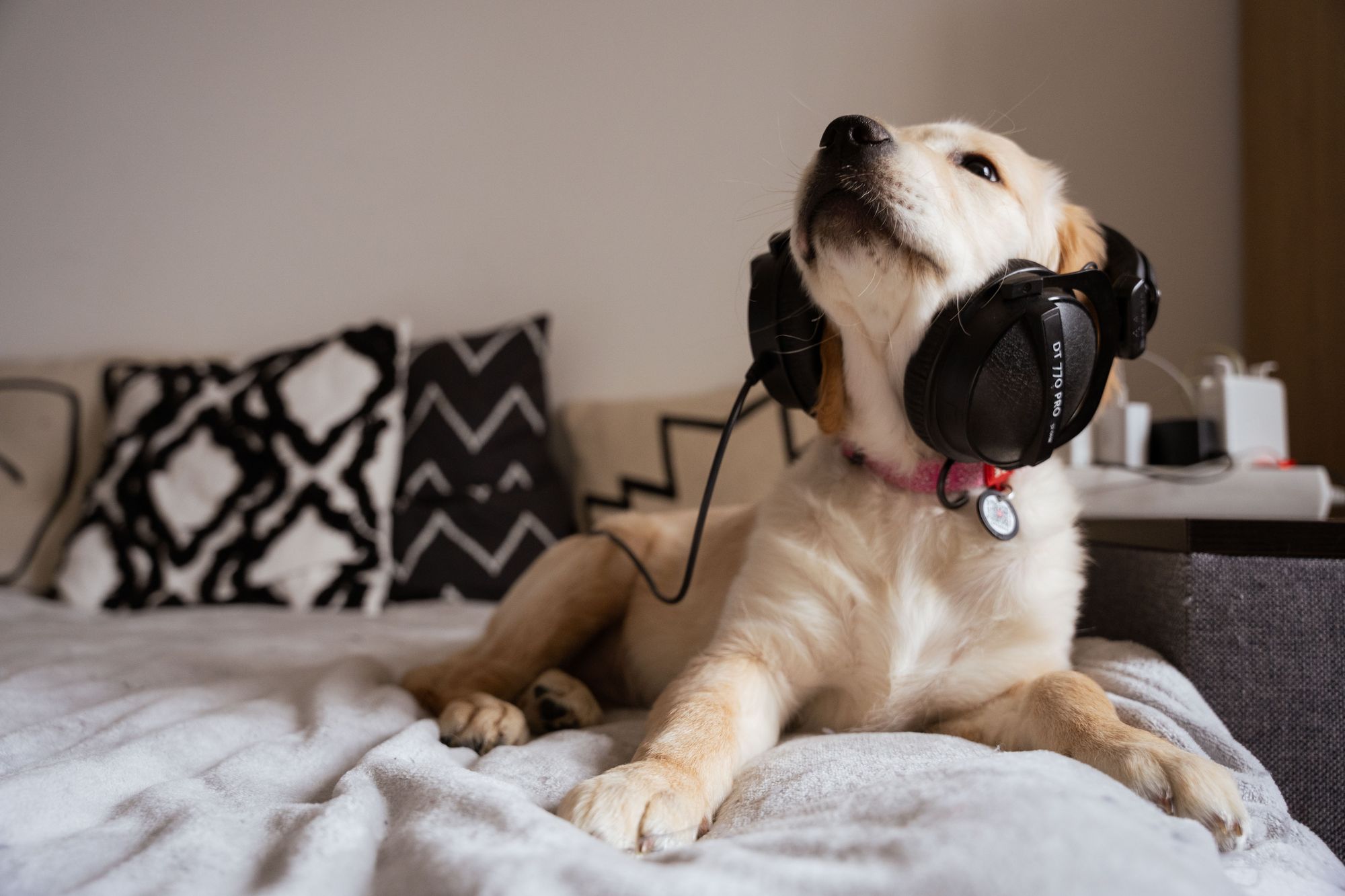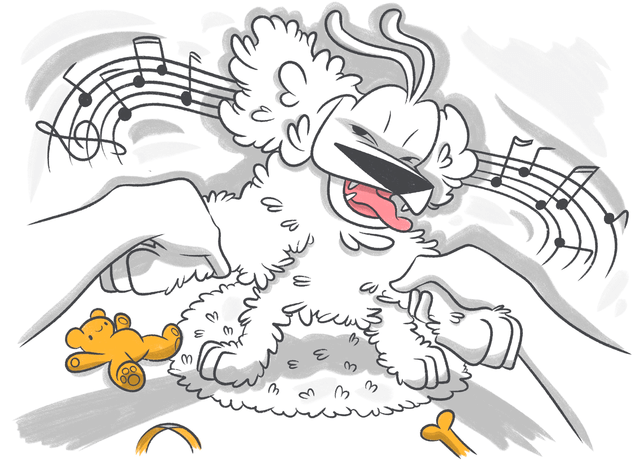If you're a dog owner and a music lover, you may have wondered if your dog likes music. In short, the answer is yes, dogs like a good tune. Also, music and other noises can be a great way to calm your dog and help them settle.
In this article, we explore the fascinating topic of dogs and music, delving into what kind of music they like, their reactions, and the potential benefits of different types of music for our canine companions.
Stop Googling - Ask a Real Vet
Content:
- Calming Music for Dogs: What Music Calms Dogs Down
- Music for Dogs to Sleep
- Other Sounds That Dogs Love
- Sounds That Dogs Hate
- Conclusion
Calming Music for Dogs: What Music Calms Dogs Down
Just like humans, dogs can find solace in soothing melodies, and it can help calm them down. The right music can help reduce anxiety, promote relaxation, and create a peaceful environment. Playing calming songs, especially when you're away, can help ease separation anxiety and create a more serene atmosphere for your dog. It's especially great for dogs who are stressed or restless.
Using a Petcube Camera lets you watch your dog's response to the music while you're away, so you can assess what kind of music your pup responds to best.
But what kind of music do dogs usually like the most? Well, dogs tend to calm down with almost any music genre (heavy metal is the exception), but soft rock and reggae typically have the best results. Classical music for dogs does work well to calm them down, but surprisingly, not as well as reggae. One study tested Soft Rock, Motown, Pop, reggae, and classical music on dogs in a kennel. The study found the best results with soft rock and reggae.
Research in an animal rescue center found that when they played music for dogs, especially male dogs, they began to settle and lay down rather than stand and bark. Stress markers, like their heart rate and cortisol (a stress hormone) in their system, lowered, showing that the dogs became calmer.
The problem is that the dogs started getting used to music after the second day or so. Playing music all the time for your dog probably won't work. However, playing music periodically when your dog is stressed is a great way to help them cope. You can also mix the different genres so they don't learn to tune it out.
At night, when there is not a lot of ambient noise, my dogs sometimes become restless and can take to barking when they hear other dogs barking in the distance. My solution is to bring them inside and play soft music for about an hour. My favorites are folk and reggae, especially since reggae like Bob Marley always makes me feel upbeat but calm.
Remember, dogs are incredibly perceptive, so the best music to calm dogs is also the music that puts their owner in a calm and happy mood. Research shows that dogs have something called "emotional contagion," which is like empathy and means that dogs tend to mirror our emotions.
So the good news is that the best music to help calm a puppy or your old timer is the same music you feel most at peace with.
Music for Dogs to Sleep
Music can also assist dogs in achieving restful sleep. Soft, slow-tempo melodies or classical music with minimal variation can be soothing and promote a deep sleep for your canine companion. Creating a playlist of sleep-inducing music can be beneficial, particularly for dogs who struggle with sleep disturbances or have difficulty settling down at night.
However, music for dogs does not have to be classical. You can have a lot of success with soft acoustic guitar, gentle reggae, folk music, soft rock, or anything with a gentle rhythm.
Experimenting with different music can help. But so can teaching your dog to associate certain kinds of music with time to sleep.
This means you can begin by tiring your dog out with an activity and start playing a specific song when they lay down and look drowsy. Over time, your dog will learn to associate the song with being tired and sleepy, and you can start to use the song as a signal to your dog that it's time to sleep.
Remember, dogs have sensitive ears, so blaring loud music is not a good environment for them.
Other Sounds That Dogs Love

Beyond music, dogs have a fondness for various sounds. The most obvious sounds dogs love are those they positively associate with. This could be their favorite person speaking to them or other people's laughter. Or it could be the sound of a fridge door opening or a plastic bag rustling in the kitchen, which could mean a treat!
A sound that I like to use for new puppies is a heartbeat. Dogs can hear a heartbeat from across a room, and when a new puppy arrives, they often struggle to settle without the warmth of their littermates and their siblings' heartbeat.
So a few soft toys and a white noise machine that plays heartbeat sounds can go a long way toward helping your new puppy sleep.
I also use white noise machines to drown out ambient noises at night that can make my dogs restless. Trying different noises, like rushing wind, rain, and fire, can be a great way to drown out other noises that bother your dog. I also love using brown noise to settle my dogs at night and help us sleep.
There are different "colors" of noise, of which we all know white noise. But if you experiment, you may find that your dogs like brown, gray, pink, red, or purple noise.
Nature sounds, such as chirping birds or gentle rain, can captivate their attention and provide a sense of tranquility, especially if these noises also calm them down. Remember, dogs are calmer when you are.
Some dogs may also enjoy hearing the sounds of other animals in the household with whom they have a strong bond. This could include the sound of another dog's breathing while asleep or the purring of a feline friend, as it can offer a sense of familiarity and companionship.
Sounds That Dogs Hate
There are plenty of sounds that dogs hate, some more than others. Common examples include loud fireworks, thunderstorms, or high-pitched noises. Since a dog's hearing is so much more sensitive than a human's, loud, booming sounds are incredibly uncomfortable for them.
When it comes to music, studies show heavy metal can cause dogs to show signs of stress too, which is bad news for our metal lovers. Dogs also hate any sound they have a negative association with. For example, dogs with separation anxiety may hate the sound of you grabbing your car keys.
Deafening sounds can trigger anxiety or fear in dogs, leading to behaviors like shaking, hiding, or excessive barking. In such cases, providing a safe and comforting environment for your dog is important.

It's common for dogs with an extreme noise phobia to become frantic during thunderstorms or fireworks, and they may attempt to run away and injure themselves in the process. The Petcube Emergency Fund is a valuable resource that offers 24/7 online veterinary service and coverage of up to $3000 for emergencies, ensuring that your dog receives prompt care and attention when needed.
Another point is that dogs don't do well with high-pitched noises. So when people speak to dogs in a "baby" voice, I usually encourage them to lower the pitch. High-pitched voices can aggravate or overstimulate dogs, and some dogs have a lower tolerance for them. The only time I raise the pitch of my voice is during training, and I want to get them excited about training and interacting with me.
But in most cases, there's no reason to excite your dog with a high-pitched voice. A typical example of high-pitched voices being a massive problem is when a dog is in an aggressive situation with another dog or animal. High-pitched shouts and screams tend to worsen things, so it's good practice to keep your voice calm, steady, and even-pitched in any situation with your dog.
Conclusion
Dogs can definitely like music. By understanding their reactions and incorporating calming music into their daily routine, we can provide a soothing and enjoyable experience for our canine companions. Additionally, it's crucial to be aware of sounds that may cause distress and take the necessary measures to alleviate anxiety.
Through music, attention to their preferences, and access to resources like the Petcube Emergency Fund, we can enhance our dogs' well-being and strengthen our bond with them.
Was this article helpful?
Help us make our articles even better









